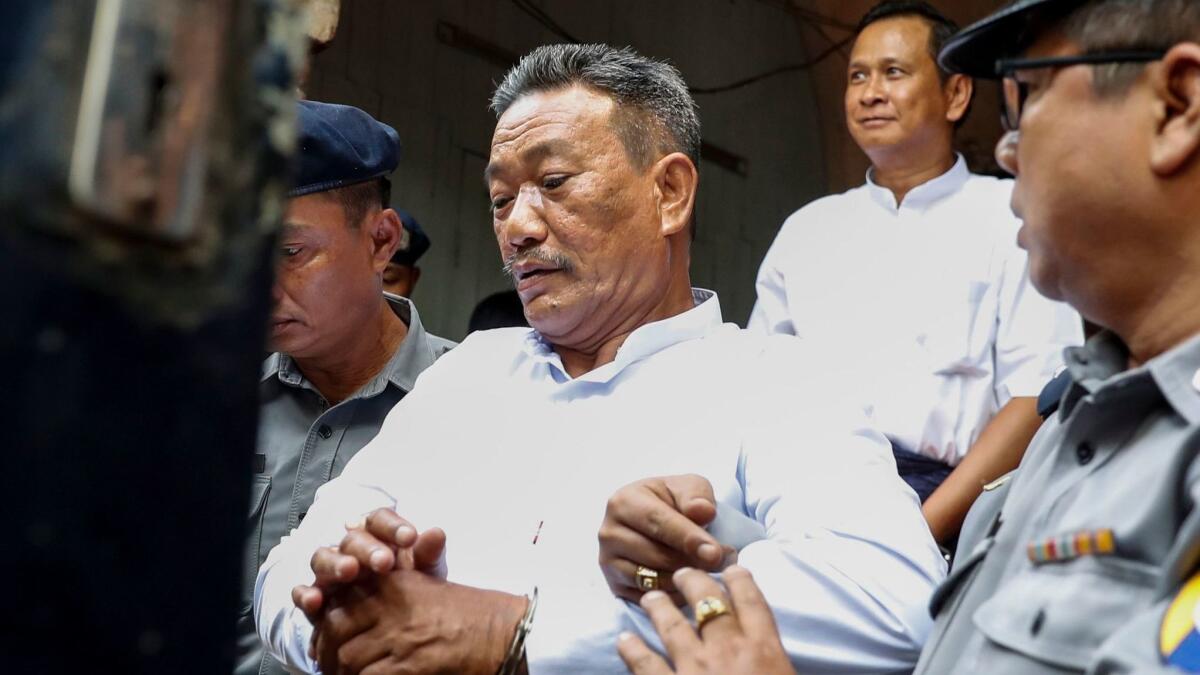Myanmar sentences two men to death for murder of prominent Muslim lawyer

- Share via
Reporting from Yangon, Myanmar — It took nearly two years, more than 100 witnesses, and often bizarre legal maneuvering by the defense. But on Friday a court in Myanmar handed down guilty verdicts, including two death sentences, to four men involved in the murder of U Ko Ni, a prominent constitutional lawyer credited for bringing pro-democracy icon Aung San Suu Kyi to power.
Ko Ni’s murder in broad daylight outside the airport in Yangon, Myanmar’s largest city, remains a blow to the country’s fragile democracy after emerging from decades under a junta. The 2017 shooting was plotted by three former military officers at a time when Ko Ni was advocating to amend Myanmar’s constitution to grant the government more civilian power.
A panel of three judges at Yangon Northern District Court issued the death penalty to Kyi Lin, a former petty criminal who gunned down Ko Ni as he was carrying his 3-year-old grandson, and Aung Win Zaw, a former military lieutenant who hired Kyi Lin.
Zeyar Phyo, a former military intelligence officer accused of financing the assassination, was given a five-year prison term, and Aung Win Tun received three years for harboring Aung Win Zaw.
Kyi Lin and Aung Win Zaw have seven days to appeal their sentences, and Zeyar Phyo and Aung Win Tun have 60 days, said Kyaw Kyaw Htike, a lawyer representing Kyi Lin.
It’s unlikely Kyi Lin and Aung Win Zaw will ever be executed in a country where death sentences haven’t been carried out in decades.
The verdicts will do little to satisfy democracy and reform advocates. The prison terms were shorter than the seven-year terms handed to two Reuters journalists accused of violating a state-secrets law by exposing a government-sanctioned massacre of Rohingya Muslims.
Meanwhile, the whereabouts of the chief mastermind of Ko Ni’s murder, a former lieutenant colonel named Aung Win Khaing, remain unknown.
The murder trial had been closely watched by human rights and rule-of-law advocates at the Geneva-based International Commission of Jurists, which assailed the proceedings in remarks last month.
“The investigation into U Ko Ni’s killing has been beset by obstacles, including the unknown whereabouts of a primary suspect, the incorrect identification of a deceased individual as a suspect and the arrest of a person with the same name, and reported military involvement in the police investigation,” the group said.
“Lines of inquiry related to the political motivations for the killing, particularly considering the military links of many suspects, do not appear to have been pursued satisfactorily, nor impartially, given military involvement in the investigation,” they added.
The country of 53 million also known as Burma continues to grapple with tension between its civilian members of government and its former military rulers, who dissolved the junta in 2011.
The country’s resurgence since then has been highlighted by Suu Kyi’s National League for Democracy party winning a parliamentary majority in 2015 and the lifting of economic sanctions by the Obama administration the following year.
But the military and nationalist extremists within the majority Buddhist population have resisted the pace of change. Their influence could be seen in the way Suu Kyi sullied her international reputation by not condemning the slaughter and mass displacement of Rohingya Muslims.
Ko Ni spoke against the violence against the ethnic group. Though not a Rohingya, he was a Muslim who defended people of his faith in a country where nearly 9 in 10 people are Buddhist.
Ko Ni, a skilled lawyer, orchestrated Suu Kyi’s rise to power by creating a position for her called state counselor. That put her above the president, a position she was forbidden to hold under the constitution because her late husband was a foreigner.
If that wasn’t provocative enough, Ko Ni then began devising a way to get rid of the army-written constitution by proposing a simple majority vote in parliament. That got the attention of the military, which began following him to public events.
Ko Ni was killed Jan. 29, 2017, standing curbside at Yangon International Airport, in the city also known as Rangoon.
Experts say the verdict Friday won’t be enough to prevent similar attacks from happening again.
“A credible and just outcome necessitates public disclosure of the motivations behind U Ko Ni’s killing,” said Sean Bain, a Myanmar-based legal advisor for the International Commission of Jurists. “Further lines of inquiry should be investigated rigorously and prosecuted if necessary. Any less may embolden the repetition of attacks against lawyers in Myanmar.”
Times staff writer Pierson reported from Singapore and special correspondent Diamond from Yangon.
[email protected] | Follow me @dhpierson
More to Read
Sign up for Essential California
The most important California stories and recommendations in your inbox every morning.
You may occasionally receive promotional content from the Los Angeles Times.











